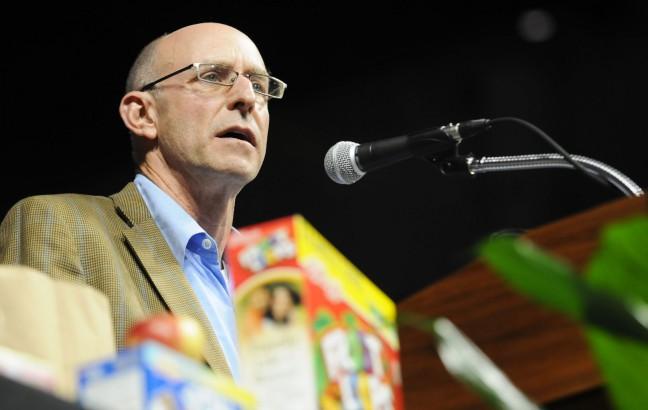Highlighting the University of Wisconsin’s first annual Go Big Read common book program, “In Defense of Food” author Michael Pollan told a 7,000 person crowd of UW students, community members and Wisconsin farmers Tuesday at the Kohl Center the Western ideology of food consumption needs reevaluation.
Consistent with the spirit of the project, hundreds of Wisconsin farmers attended the event wearing green shirts that read “In Defense of Farming: Eat Food, Be Healthy, Thank Farmers” in an act of solidarity expressing their opposition to some of Pollan’s ideas.
Pollan acknowledged not everyone in the audience was sympathetic to his work, or even his presence, but said he greatly appreciated them being there and partaking in what is shaping up to be a crucial national conversation.
Pollan added those who disagree with his ideas would likely be surprised by the amount of common ground they will find.
“I happen to believe America’s farmers hold the key to solving the national health care crisis, climate crisis and energy crisis,” Pollan said.
Considering Wisconsin is well-regarded as America’s demonstrable dairyland and leads the nation in other agricultural forays — comprising 9 percent of the state’s income –Chancellor Biddy Martin said in her opening address she could not imagine a better place to engage in a thoughtful, wide-ranging discussion about food.
The main point of dispute between the farmers and Pollan, according to Randy Roecker of Roecker’s Rolling Acres Dairy Farm, is the author’s criticism of the reliance on technology in modern farming practices.
“We’re never going to be able to feed all the mouths in this country and in the world without having technology,” Roecker said.
He added technology is used on his farm every day, and it is a necessary tool to maximize efficiency.
The debate over the use of technology in the agriculture business is often framed incorrectly, Pollan said.
“Feeding the world is not simply a matter of technology. I do know that merely increasing yield does not necessarily solve the problems,” Pollan said.
He added this is not a pro-technology versus anti-technology argument.
There needs to be ways to utilize technology in ways that eliminate the reliance on excessive amounts of fertilizer, growth hormones and feed additives, Pollan said.
For Duane Chaptman — a third-generation family dairy farmer from Tomah — however, denying farmers the ability to use technology is an unfair expectation.
“It just makes them more efficient — no different than a factory putting in a robot to do work to make them more efficient. We’re the same way,” Chaptman said.
Beyond the technology dispute, however, Pollan is highly critical of what he calls “nutritionism,” or the controlling ideology that shapes the way Westerners think about and approach food.
“Nutritionsim,” according to Pollan, is not the scientific understanding of healthy eating, as most would assume, but has rather become a marketing tool for large corporations to sell highly processed food under the guise of being healthy.
This and similar practices have effectively created a market where 90 percent of the money spent on food by Americans goes to marketers and processors, while farmers are left with mere fractions of actual food revenue, Pollan said.







